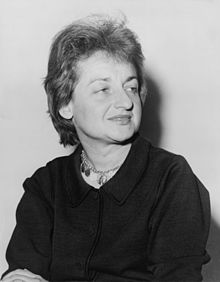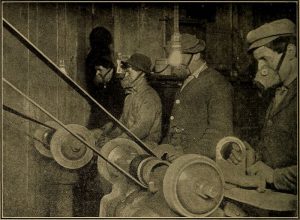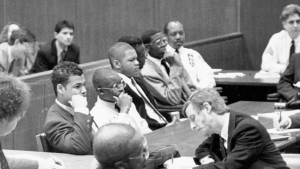In 1957, Smith College hosted the most important class reunion ever to be held in the history of America. Betty Friedan, a student of that class, attended the reunion to solve a revolutionary problem, which at the time had no name. She went with excitement to see her former colleagues and to catch up with them. Surely, after fifteen years, she assumed they would have all changed. Betty wanted to see who was successful and who was not. There were so many questions that she had for them. What were their lives like after graduation? Did any of them find a job? Were they ambitious? Were any of them unemployed? Were they able to get married and have kids? If they did, were they happy with their new lives after college? You see, Betty was not happy with her life. She wondered if anyone else felt the same way. Since she was serious in finding out the truth, she created a survey to ask her friends and colleagues. She found out that most women were dissatisfied with being housewives, just like her.1 As a result of this class reunion, Betty became passionate in improving the lives of women in America, which was the start of a big awakening for women’s rights. With every revolution, there is a spark to ignite it. The spark for what has become known as “second-wave feminism” was ignited in Betty Friedan’s heart.
In 1920, the nineteenth amendment of the United States Constitution, which announced that men and women had the equal right to vote, was passed.2 This amendment gave women the right to vote, but did it give them equality? Well, Betty Friedan committed much of her life to ensuring equality for women in America. Betty Friedan was born in 1921, the year following the passing of the nineteenth amendment. She grew up in an average family that worked hard to make ends meet. Her father Harry worked as a jeweler. Her mother Miriam was a journalist who gave up her job in order to give her children priority. Her mother was a wonderful role model for Betty. Betty had younger siblings: a sister named Amy and a brother named Harry. Her younger sister was considered by most to be the more beautiful of the two.3 Betty excelled academically, and did not care what people would say or think about her. She followed her mother’s footsteps and decided to pursue high school journalism. Betty was a member of many clubs, and she loved to work. She was also very active and was considered a maverick in high school. Betty knew that she had a voice and wanted the world to know that too. When the school paper turned down her idea to write her own column, she refocused her energies and started The Tide with other friends. The Tide was their own unique magazine. Being a maverick, outgoing, self-confident, and a young woman caused Betty to be considered socially unattractive until her college years.4
Betty graduated from high school and attended Smith College. She was very fond of writing poetry and studying psychology. Just like in high school, she was studious, ambitious, and a hard worker, which made her one of Smith College’s finest students. She received scholarships and other prestigious awards. She then graduated summa cum laude in 1942 with a degree in psychology.5 After college, Betty received a fellowship to work with the prestigious Erik Ericsson at the University of California at Berkeley. Her future was bright and everything was going by so quickly for her. However, her passion was journalism and she wanted to redeem what her mother had not been able to accomplish. This ambition led her to New York to pursue journalism. Betty fell in love with her journalism career, with New York, and with the opportunities offered in a big metropolitan city. New York City is a place where you can find yourself and maybe even find love. In New York, Betty met her future husband, Carl Friedan, a public relations firm manager. They had three children together: Daniel, Jonathan, and Emily.6
The honeymoon lasted a “New York minute.” They had a dreadful marriage. Carl Friedan was verbally and physically abusive to her. Betty was distraught. She loved her children and wanted to give them a wonderful life. As the years went by, she fell deeper and deeper into depression and was not satisfied in her life, especially with her troubled marriage. She lost her love of journalism, love of life, and love of her husband; and the responsibility of caring for her children consumed her mentally, physically, and emotionally. As much as she loved her children, Betty no longer wanted to feel the torture of just being a mother without an inspiring job.7
One day, a very important letter came in the mail. She did not know it then, but it was her invitation to freedom: the Smith College class reunion. Betty went to the reunion wanting to know if her friends from college were experiencing life the way she was. Betty was passionate about knowing the truth. Fearing that her friends would not be truthful, she decided to create a survey and pretend that it was part of a journalism and psychology assignment. The survey consisted of thirty-eight questions that focused on the women’s perspective of their lives. The survey questions included some of the following: How many children do you have? Are you happy in your relationship? Are you able to speak openly towards your husbands? Have you been interested in another man since marriage? Does your husband complain about your housework? What’s your highest form of education? Would you consider running for a political office?8 The results of the survey were very revealing and astounding. She found out that she was not the only one. This was a revelation to her and a call to action. With the survey results that she had collected, she had enough to start a Declaration of Independence for women’s rights. As she went over the survey results, she wanted to dig deeper. She decided to start interviewing women and asking them to describe their everyday lives more in detail. By doing this Betty found more intimate and heartbreaking stories of women that were struggling just like her. Unfortunately, women were perceived to adhere to certain protocols regarding their mannerisms, appearance, status, and beauty. Women were expected to be housewives and cater to their husbands without any complaints. Betty, however, despised these stereotypes placed on women and the survey results confirmed it.
On February 19, 1963, Betty Friedan published her first revolutionary book, The Feminine Mystique.9 The book encouraged and empowered women not to settle for being just housewives. In the book, Betty revealed the lives of many women who shared their experiences of being stressed, unappreciated, unloved, and beaten not just by their husbands but by society. These real-life stories touched numerous lives and created an awareness of respecting the dignity of women and the important role they play in society and in the home. This perspective not only gave the reader but the world an idea of what women had silently been struggling with. Her words were loud and powerful, and needed to be in order to make the audience aware of “the problem that has no name.”10
The Feminine Mystique was phenomenal, and as a result of her popularity, Betty became known as a feminist. She wrote a series of motivational books to empower women. In 1981, she wrote The Second Stage, followed by The Fountain of Age in 1993, and Life So Far in 2000. These books not only talked about her life after her terrible divorce, but also how she was able to find herself, overcome adversity against many odds, and pursue her dreams. Few people, especially women, have had the courage that Betty demonstrated. She had the courage to stand up and speak in favor of equality for women at a time when women were oppressed. She motivated all women to not only give and sustain life, but also to give life to a society that values and respects the dignity of women and their contributions as wives, mothers, and citizens.
Betty Friedan died on February 4, 2006. She will always be remembered as the woman who spoke up when others couldn’t. Just as Betty wrote in The Feminine Mystique, “The only way for a woman, as for a man, to find herself, to know herself as a person, is by creative work of her own.”11
- Betty Friedan, The Feminine Mystique (New York : Norton, 1963), 123. ↵
- National Archives and Records Administration, Washington, DC., 2002, “Woman Suffrage and the 19th Amendment. Teaching with Documents,” ERIC, (accessed April 8, 2018). ↵
- Jewish Women’s Archive Encyclopedia, March 2009, s.v. “Betty Friedan,” by Marion Kaplan. ↵
- Jewish Women’s Archive Encyclopedia, March 2009, s.v. “Betty Friedan,” by Marion Kaplan. ↵
- Salem Press Biographical Encyclopedia, 2013, s.v. “Betty Friedan,” by Eleanor B. Amico. ↵
- Salem Press Biographical Encyclopedia, 2013, s.v. “Betty Friedan,” by Eleanor B. Amico. ↵
- Magill’s Literary Annual, 2000, s.v. “Betty Friedan.” ↵
- Betty Friedan, “Betty Friedan’s 1957 Questionnaire at Smith College,” PDF. ↵
- Dan Seligman, “The Friedan Mystique,” Commentary Literary Reference Center 121, no. 4 (April 2006): 42-46. ↵
- Betty Friedan, The Feminine Mystique (New York: Laurel, 1982). 474. ↵
- Betty Friedan, The Feminine Mystique (New York : Norton, 1963), 472. ↵



25 comments
Didier Cadena
This was a very interesting article. I am not too familiar about who Betty Friedan was, so it was great to get an insight about who she was. The way that she was able to transform her life, through the hardships of a terrible marriage, is a great feat. The article does a great job of telling the story of Betty Friedan and keep the reader engaged in the article.
Aneesa Zubair
This was a very engaging article. I knew about The Feminine Mystique, but not about the author behind it. Betty Friedan had a very interesting life – starting her own magazine, surveying the women in her college class, and then writing about her findings and using them to help change society’s perception of women. I love the quote, “The only way for a woman, as for a man, to find herself, to know herself as a person, is by creative work of her own.” Friedan clearly demonstrated this through her own creative work, like her books, research, and activism.
Sebastian Carnero
It is amazing how the opinions of other people can encourage you to do things differently. I didn’t know that reunion had such impact on her, I guess when you know you are not alone things do not look that hard to accomplish. Personally, I find it very inspiring how she continued her mother’s dream and how she resigned on leaving her career and decided to use it for helping other women.
Gabriela Ochoa
I never knew that the start of women’s rights came from her attending a class reunion and talking to the women there who also felt dissatisfied with being a housewife. I knew that she had written The Feminine Mystique but I never knew of the impact it had on women. She and her books encouraged many women to go out and seek rights to be their own person and without her efforts women wouldn’t be able to vote today.
Julissa Cantu
The article clearly states in the first paragraph that Friedan was born after women were given the right to vote and, while I agree everything Friedan did was an accomplishment to further the rights of women, you can not give her credit for something she was not alive to do.
Micaela Cruz
I recognized Friedan’s book The Feminine Mystique because it was mentioned in the movie 10 Things I Hate About You… love that movie. But I had no idea that the author, Betty Friedan, started a whole movement based on empowering women. This lady has not received the credit she deserves, I believe that she is the reason why us females are fed up with sitting by and letting the men succeed (no offense to the men). The author chose a great topic to write about and as for Betty Friedan, her accomplishments and drive to make something of herself and to encourage other ladies to do so is truly admirable. It’s absolutely revolutionary.
Cooper Dubrule
Betty Friedan deserves great respect because in order to start a movement such as hers in the time it was done was a hard thing to do, especially as a woman. I like the way this article starts of at a class reunion and gives out what she was thinking, then turns to he dissatisfaction with the world and what she did to change it.
Daniela Cardona
Betty Friedan is inspiring. I love how she didn’t feel whole in life, and instead of just sticking it out and going with the motions, decided to do something about it. I also love that her emphasis was on women. I think society, especially during her time, is very rough and stereotypical in the way it views women. For her to want nothing more than to feel empowered and to empower is beautiful. The fact that being someone’s mom or someone’s husband wasn’t enough for her really resonates with me. My biggest fear is to become someone else’s something rather than my own something.
Rylie Kieny
This article was very interesting and informative. It was like a mini biography. I felt like I experienced the important parts of her life in chronological order. I never knew there was a “second wave” of feminism. It was interesting to see how she included the survey into her class reunion. She felt dissatisfied and found that women around her did to. She allowed women to speak out while staying anonymous. She then used her data to start a new wave of women equality that would help change the world forever.
Mariah Cavanaugh
This was a fantastic article! Betty Friedan’s The Feminine Mystique was a turning point in gender equality. Towards the end of your article, you so beautifully said, “she motivated all women to not only give and sustain life, but also to give life to a society that values and respects the dignity of women and their contributions as wives, mothers, and citizens.” That is a statement which will stay with me for a while. Women can give life in many ways, not all of which are the same.
Honoka Sasahara
The story of Ms. Friedan made me think that women can have potential to work in lifetime and never need to be a hoseworker.
The idea seemes to make me strong because it means that we women have more choices in our lives than we thought before.
Although Friedan’s experience of marriage had suffered her, it made her stand up and led to the power of inspireing many other females.